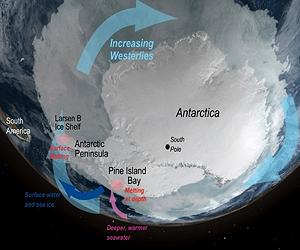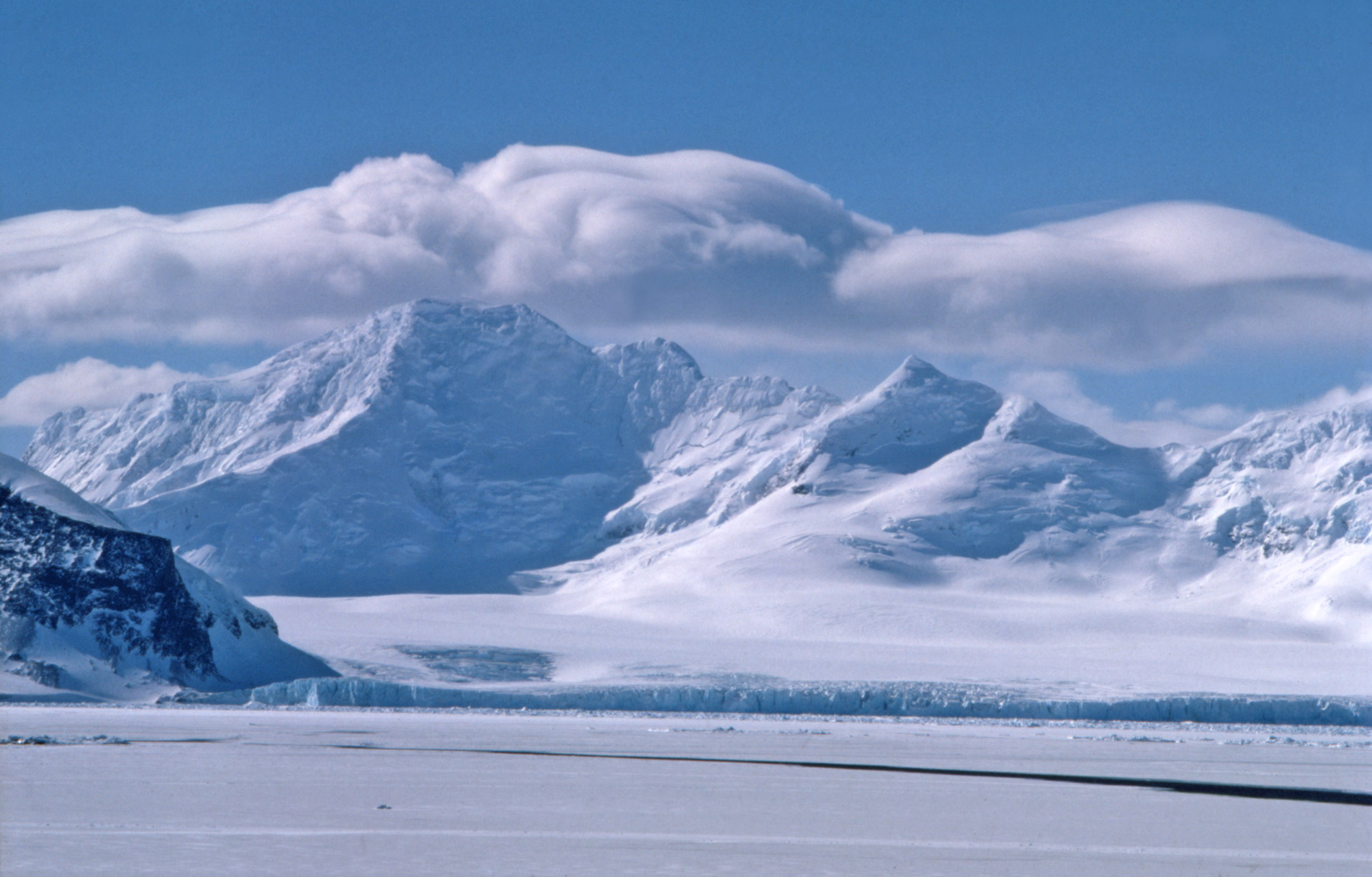The Cayman Institute is an apolitical, privately funded, non profit organization established to consider the long term effects and implications of diverse technological, sociological, economical and cultural issues to the Cayman Islands. Its members work on a voluntary basis and offer strategic plans for consideration to guide the delivery of nearer term projects, so as not to jeopardize the future of the islands' infrastructure, financial and human resources.
Monday, December 20, 2010
Red Seaweed Could Be the Next Biofuel Super-Crop
The new development could help small island nations and other sea-bound regions grow biofuel crops without giving up scarce land resources that are needed to grow food. But it also opens up some challenges down the road as human use of the marine environment increases.
Biofuel from Red Seaweed
When it comes to extracting fuel from non-food biomass, seaweed has general advantages over land crops. The most obvious one is the relative absence of hard fibers that are difficult to break down into sugars. Marine biomass degrades much more easily than land crops, but there is still a catch. When red seaweed is broken down it yields both glucose and galactose (a less “sweet” form of sugar), and until now it has been difficult to find an efficient fermentation process for galactose. The University of Illinois team identified three genes in a common microbe, Saccharomyces cerevisiae, that can be pumped up to increase galactose fermentation by 250 percent. More >>>
Thursday, December 16, 2010
Unstable Antarctica: What's Driving Ice Loss
Dec 16, 2010 Scientists have previously shown that West Antarctica is losing ice, but how that ice is lost remained unclear. Now, using data from Earth observing satellites and airborne science missions, scientists are closing in on ice loss culprits above and below the ice.
The findings, presented Dec. 15 at the fall meeting of the American Geophysical Union (AGU) in San Francisco, Calif., are expected to improve predictions of sea level rise.
Time Not Healing Glacial Wounds
A new analysis by Ted Scambos, a glaciologist at the National Snow and Ice Data Center in Boulder Colo., and colleagues found that more than a decade after two major Antarctic ice shelves collapsed, glaciers once buttressed by the shelves continue to lose ice. More >>>
Tuesday, December 14, 2010
Climate-vulnerable island states get boost for moving into renewable energy
A memorandum of understanding was signed between the Alliance of Small Island States (AOSIS), the Government of Denmark, the World Bank, and the United Nations Development Programme (UNDP), recognising the disproportionate harm of climate change for small island developing states and aims to support island countries to scale up their renewable energy efforts and shift to greater energy efficiency.
An 80 million Danish kroner (€11 million) pledge of support from the Government of Denmark has helped kick off the initiative, which is expected to help island states from the Africa, Caribbean, and Pacific Islands regions transition to low-emission, climate-resilient development paths.
World Bank Group President Robert B. Zoellick jointly signed the agreement with Tillman Thomas, Prime Minister of Grenada and head of AOSIS; Lykke Friis, Denmark’s Minister for Climate and Energy; and Helen Clark, UNDP Administrator. Zoellick said the initiative supports a group of nations that have been among the most active and most vocal at climate negotiations for many years.
“Small island developing states have been sounding the alarm about climate change for years now and have earned the title of ‘the conscience of the climate convention’,” Zoellick said. “They are leaders in taking actions on adaptation, and the World Bank Group has increased support to them for this purpose. This new initiative extends this support to clean energy, which will contribute to mitigation and also help reduce the islands states’ very high import bills for fuel.”
Breaking oil dependence
Because of their size and remoteness, most small island developing states are heavily dependent on imported petroleum for their energy needs. Some countries spend an estimated 25 – 50 percent of their GDP on imported oil, which leads to very high domestic electricity costs.
“Reducing fossil fuel consumption is a ‘win-win’ for small island developing states”, said Helen Clark of the UNDP. “It reduces the greenhouse gas emissions responsible for the rise in global temperatures, while at the same time improving energy security and freeing up national spending for investment in climate-resilient development.”
One of the expected benefits from this renewable energy initiative will be the freeing up of “fiscal space” for governments to spend on development and climate-resilient action.
“Climate change has the potential to derail all the good work that countries have undertaken for decades to overcome poverty and boost growth,” Zoellick said. “In countries with the possibilities of renewable energy sources, overall development is undermined if governments are spending so much on imported fossil fuels.”
The World Bank and the UNDP will facilitate the trust fund that will be established from the memorandum of understanding.
For additional information: http://bit.ly/fzaVI0
Friday, December 10, 2010
World Bank: Governance and Climate Change
According to the World Bank Group’s Governance and Anticorruption Strategy (GAC), governance is “the manner in which public officials and institutions acquire and exercise the authority to shape public policy and provide public goods and services”. Poor governance permits and even promotes corruption resulting in private gain and abuse of public office. Resources that should fuel development and reduce poverty enrich corrupt elites. Institutions matter, and civil society groups and parliaments can promote transparency and accountability, thereby strengthening governance and helping countries achieve the Millennium Development Goals (MDGs).
Good governance is necessary to effectively overcome development challenges and ensure sustainable development. The urgency of addressing these challenges is heightened by the need to combat the impacts of climate change. For developing countries, better management of floods, droughts and storm surges is necessary, while also maintaining gains made in reducing poverty.
Climate change also provides opportunities in using new financial instruments to achieve low carbon, climate-resilient and socially equitable development. However, for countries to receive international financing to address climate change, adequate governance institutions in developing countries must enable effective use of funds. Other governance-related questions include the following:
• Can funds support public sector works and do adequate institutions exist for implementing projects without corruption concerns?
• Can policy and legislative frameworks be developed for market-based instruments to be used effectively by the private and public sectors for climate-friendly development?
• Can existing institutional frameworks effectively combine weather-related insurance and natural disaster risk management as part of the adaptation agenda?
• Can different line ministries work together to address the climate-development challenges?
• Can public policies provide an umbrella for public-private initiatives, i.e., to: inform consumer choice on energy efficiency appliances and building construction; and ensure land tenure, access and rights of local and indigenous peoples are not eroded through reducing emissions from deforestation and forest degradation (REDD)?
• Can policies be developed to help reduce land-based carbon emissions and land-water degradation, and provide payments to local and indigenous communities to help reduce poverty?
To address some of these questions, the World Bank Institute (WBI) is bringing together its work on governance and climate change in many of its activities and for different stakeholders. For example, youth activists are critical to social accountability efforts, and, as future leaders, they have a role to play in shaping climate-friendly development. Parliamentarians shape national development agendas, and their representative, legislative and oversight responsibilities are essential for taking action on climate change and development. This issue of the e-bulletin addresses what WBI is doing to engage with and enhance the capacity of these stakeholders.
WBI’s Climate Change Practice is also facilitating action on adaptation, particularly in many African countries. The section on knowledge products and activities of the agriculture, water and natural resource management program showcases our efforts in this arena. This e-bulletin also covers other areas WBI is focusing its efforts on, such as Cities and Climate Change. It also addresses the ongoing work of Carbon Finance Assist, which highlights the use of market and, increasingly, non-market instruments to reduce emissions.
I would like to thank Mitchell O’Brien and Miriam Bensky in the WBI Governance Practice for their contribution to this preface. We hope you enjoy these articles and we look forward to interacting with you further.
Habiba Gitay
Sr. Environmental Specialist and Acting Practice Manager
WBI Climate Change Practice
Wednesday, December 8, 2010
Many Strong Voices Holds First Advisory Committee Meeting
Monday, December 6, 2010
Outside Cancún climate conference, Caribbean Sea testifies to global warming
This summer’s extreme heat may seem like a distant memory as winter approaches the United States.
But the summer that broke heat records across the Northern Hemisphere is still being felt below the surface of the Caribbean Sea: 2010 will likely be one of the most deadly years on record for coral reefs.
If diplomats attending the two-week global climate change talks that opened Monday in Cancún, Mexico, want more evidence of the negative and potentially devastating affects of warming temperatures, they need look no further than the blue sea outside their hotels. Researchers say that throughout the Caribbean coral reefs are “bleaching,” a condition that occurs when they are under extreme stress due to warmer-than-normal sea temperatures. More >>>
Saturday, December 4, 2010
Never an Empty Bowl: Sustaining Food Security in Asia
Friday, October 15, 2010
Small Island Developing States seek international commitment
 |
| Dessima Williams |
Thursday, October 7, 2010
Sunday, October 3, 2010
China leading the world in clean energy investment
SHANGHAI -- September 30, 2010 -- As weary visitors wait to enter the Shanghai Corporate Pavilion at Expo 2010, a sprinkler system using recycled rainwater and powered through a solar thermal system cools them off with periodic misting.
Once they enter the exhibit at the world's largest fair, tourists learn about high-speed trains and other energy-efficient inventions that have begun to proliferate in China.
"Shanghai has developed so fast, its natural resources have disappeared," reads one placard at the expo. Several yards away, a film presentation plays in which the narrator asks, "What's the future of Shanghai?"
It is a question that is far from decided. But China's emphasis on developing clean energy sources has rattled some of its economic competitors and could transform the global energy marketplace. More >>>
Tuesday, September 21, 2010
Warming in Deep Southern Ocean Linked to Sea-Level Rise
Warming waters in the deepest parts of the ocean surrounding Antarctica have contributed to sea-level rise over the past two decades, scientists report today (Sept. 20).
In an attempt to pinpoint all culprits for the rising oceans, scientists analzyed warming trends in the abyssal ocean — below about 3,300 feet (1,000 meters), said study team member and oceanographer Sarah Purkey of the University of Washington in Seattle.
The scientists found that the strongest deep warming occurred in the water around Antarctica, and the warming lessens as it spreads around the globe. The temperature increases are small — about 0.05 degrees Fahrenheit (0.03 degrees Celsius) per decade in the deep Southern Ocean, and less elsewhere. More >>>
Saturday, August 28, 2010
Peak oil: two words to worry about
The crisis would be so severe, we wouldn't be able to run our tractors, heat our homes or drive our cars
AUGUST 27, 2010 - As if you don't have enough to worry about, add two more words to your list: peak oil.
Forget climate change -peak oil is the biggest problem on the human horizon according to some. Bullcrap, say others.
The idea is actually hard to explain, which may be why many have never heard of it. But if the peak oil theory is true, it will affect us all drastically, so it's worth a shot:
Technically, there is lots of oil left in the world. We're often told the supply could last 40 or 50 years. But peak oil is the exact point at which oil production peaks. The idea is you don't need to run out of oil to get into trouble. You just have to reach the "peak," the point where you've passed maximum output and start to run out. At that point, oil becomes finite and something big happens -the price surges. That jump would be so violent and unavoidable, say some, that the global economy would simply run out of affordable gas and, in a worst-case scenario, would collapse. The crisis would be so severe, we wouldn't be able to run tractors, heat our homes or, naturally, drive our cars. Soon we'd be living like 17th-century pioneers in the shell of our former gas-driven civilization. More >>>
Monday, August 23, 2010
If a Country Sinks Beneath the Sea, Is It Still a Country?
Rising ocean levels brought about by climate change have created a flood of unprecedented legal questions for small island nations and their neighbors.
Among them: If a country disappears, is it still a country? Does it keep its seat at the United Nations? Who controls its offshore mineral rights? Its shipping lanes? Its fish?
And if entire populations are forced to relocate -- as could be the case with citizens of the Maldives, Tuvalu, Kiribati and other small island states facing extinction -- what citizenship, if any, can those displaced people claim?
Until recently, such questions of sovereignty and human rights have been the domain of a scattered group of lawyers and academics. But now the Republic of the Marshall Islands -- a Micronesian nation of 29 low-lying coral atolls in the North Pacific -- is campaigning to stockpile a body of knowledge it hopes will turn international attention to vulnerable countries' plights.
"At the current negotiating sessions and climate change meetings, nobody is truly addressing the legal and human rights effects of climate change," said Phillip Muller, the Marshall Islands' ambassador to the United Nations. More >>>
Friday, August 20, 2010
Caribbean Storm Damage Costs May Rise 50% With Global Warming
Aug. 19 (Bloomberg) -- Climate change may add 50 percent to the storm damage costs incurred by some Caribbean nations over the next two decades, said Swiss Reinsurance Co., the world’s second-largest re-insurer.
Wind, storm surges and inland flooding already cost some Caribbean nations up to 6 percent of their economic output each year, the Zurich-based company said today in a statement on its website. Global warming could add costs amounting to another 1 to 3 percent of output by 2030, it said.
Insurers are being hit with more claims as damages from natural catastrophes rise. Costs to clean up after storms and other natural disasters reached a record $180 billion in 2005, of which insurers covered about half, according to Munich Re, the biggest re-insurer. More >>>
Tuesday, August 10, 2010
Monday, August 9, 2010
How Will Small Businesses Survive Peak Oil?
So much so, that Virgin bross Richard Branson believes we should bemobilizing for peak oil as if for war. But what about the little guy? It's often assumed that because peak oil will make global shipping a challenge, that we'll just transition back to smaller, more local economies. I suspect the truth will be a little more complicated than that.
As much as we TreeHuggers like to espouse the virtues of local business and human scale economies, there can be few businesses out there—big or small—that find themselves immune to the threat of rising energy prices or economic volatility. And as recent events have shown, while corporations may find themselves on shaky ground, there is often a helping hand out there to stop the giants from failing. Will that be the same for the small operators? A small social enterprise in the UK is aiming to ensure that we head the problem off before it becomes a crisis. More >>>
Friday, August 6, 2010
Clean Energy and Cultural Survival in Nicaragua
PARIS, Aug 1, 2010 (Tierramérica) - For the past six years, French and U.S. engineers have been installing solar panels and wind turbines in the southeastern Nicaraguan town of Bluefields, promoting clean energy and development among the region's Rama indigenous peoples.
In 2004, French engineer Lâl Marandin and the Franco-U.S. brothers Guillaume and Mathias Craig founded blueEnergy, a non-governmental organisation with resources and donations from companies and foundations in France and the United States.
More >>>
Thursday, August 5, 2010
12 Events That Will Change Everything: # 1 Sea Level Rise
This Web-only article is a special rich-media presentation of the feature, "12 Events That Will Change Everything," which appears in the June 2010 issue of Scientific American More >>>
Wednesday, July 14, 2010
Hawaii moves closer to green-energy goals
HONOLULU, July 14 (UPI) -- A 30-megawatt wind farm on the Hawaiian island of Oahu will reduce oil consumption by nearly 140,00 barrels per day, a company said.
U.S. wind energy company First Wind broke ground on the Kahuku Wind project on Oahu's north shore. The project could provide enough renewable energy to power more than 7,000 homes and reduce oil consumption by as much as 139,500 bpd, the company said in a statement.
Hawaii Gov. Linda Lingle, a Republican, said the project would help the state meet its goal of getting 70 percent of its energy for electricity and ground transportation by 2030. More >>>
Wednesday, July 7, 2010
Public Meeting Dates – Cayman Islands National Conservation Law
Conservation Law Meetings
| Public Meeting Dates – National Conservation Law | ||
| Date | Location | Time |
| Thursday July 1st | North Side Community Centre | 7 – 9pm |
| Tuesday July 6th | Bodden Town Primary School Hall | 7 – 9pm |
| Thursday July 8th | Elmslie Church Hall, GT | 7 – 9pm |
| Saturday July 10th | Trust House, Little Cayman | 7 – 9pm |
| Monday July 12th | John A. Cumber Hall, West Bay | 7 – 9pm |
| Tuesday July 13th | East End Communicty Centre | 7 – 9pm |
| Thursday July 15th | Aston Rutty Centre, Cayman Brac | 7 – 9pm |
Tuesday, June 29, 2010
Maldives - Green growth improves water security – President Nasheed
In his keynote address at the Asia-Pacific Water Ministers’ Meeting in Singapore, President Mohamed Nasheed spoke on the link between the low carbon growth and water security.
He said, for the Maldives “the links between low carbon growth and water security are particularly pronounced.”
The President said although the most of the country was ocean, the Maldives still had acute fresh and drinking water problems.
He said freshwater lens that provide water for drinking, washing and agriculture has become contaminated by sewage and salt water intrusion forcing a large part of the country to depend on other sources of water including desalinated water.
Many of these problems “arise because of poor governance of water supplies over the past few decades”, added the President.
Speaking on the higher cost and energy inefficiency of desalinated water, the President said, many islands that cannot afford desalinated water rely of unreliable rainwater harvesting. More >>>
Sunday, May 23, 2010
No margin for error
He described it like this: "The world is on a journey to an unstable destination, through unfamiliar territory, on an uneven road and, critically, having already used its spare tire."
I like that image. America used its spare tire to prevent a collapse of the banking system and to stimulate the economy after the subprime market crash. The European Union used its spare tire on its own economic stimulus and then to prevent a run on European banks triggered by the meltdown in Greece. This all better work, because we're not only living in a world without any more spares but also in a world without distance. Nations are more tightly integrated than ever before. We're driving bumper to bumper with every other major economy today, so misbehavior or mistakes anywhere can cause a global pileup.
And that leads to the real point of this column: In this kind of world, leadership at every level of government and business matters more than ever. We have no margin of error anymore, no time for politics as usual or suboptimal legislation. But what does that mean,
"leadership"? More >>>
53 Megawatt Ice Energy Storage Trial Begins In Glendale, California
Over the next few weeks, a consortium of municipal utilities in California will begin retrofitting government offices and commercial properties with systems that use ice made at night using cheap surplus wind power to replace air-conditioning that they would have required during the afternoon.
The first cheap energy storage cooling units housed at distributed sites on the buildings will be networked, providing utilities with a resource that can be dispatched as needed to help manage demand on the grid. If the pilot project works as expected, it will demonstrate savings, such that if put into general use, would reduce fuel consumption by state utilities by up to 30%, and by individual building owners by up to 90%. More >>>
The Cayman Islands needs to consider off peak electricity rates to enable similar technology to be used here. These islands must move towards energy efficiency and efficiency. Editor
Wednesday, May 19, 2010
Costs Rica's top climate change negotiator to Head UNFCCC
Christiana Figueres, daughter of a former president of her country, is the new executive secretary of the United Nations Framework Convention on Climate Change (UNFCCC).
Mr de Boer stepped down shortly after the Copenhagen climate change talks in December last year, following almost universal criticism branding them as a 'disappointment'.
UN secretary-general Ban Ki-Moon said he was 'grateful' to Mr de Boer for his 'dedicated service and tireless efforts' on behalf of the climate change agenda.
He said: "She is an international leader on strategies to address global climate change and brings to this position a passion for the issue, deep knowledge of the stakeholders and valuable hands-on experience with the public sector, non-profit sector and private sector." More >>>
Sunday, May 9, 2010
Small Islands Urge Action at UN Oceans Meet
"We are seeing the threat that fisheries will collapse, the threat of tourism-collapse and the loss of biodiversity," said Rolph Payet, special advisor to the President of the Seychelles.
"Some people think that this is just a simple matter to be brushed aside, and to continue with business as usual, emitting greenhouse gases (GhGs) as usual,'' Payet said. "The data shows us that we should be worried, and we should be acting. In fact we should have acted yesterday," he said.
His comments came at the fifth Global Oceans Conference taking place here at the United Nations Educational, Scientific and Cultural Organisation (UNESCO). The May 3-7 meeting has brought together 823 delegates from 80 countries, including many developing nations. More >>>
Thursday, May 6, 2010
Industrial Chemicals Ranked By Warming Potential
Wednesday, May 5, 2010

SRS Energy’s unique thinfilm solar tile, the Solé Power Tile has just passed a key milestone. SRS Energy has obtained an ETL listing report certifying the Solé Power Tile has passed the testing associated with the Underwriters Laboratory (UL) UL 1703 standard. Passing this is the prerequisite for any solar photovoltaics to be approved by the State of California as eligible for CSI rebates from utilities. More >>>
Friday, April 30, 2010
Hawaii Raises Oil Prices, Should Cayman Follow?

Gas prices, power bills and shipping costs will rise after the Hawaii Legislature voted to override a veto of a $1-per-barrel tax increase on oil products.
Hawaii already has the most expensive electricity rates and gas prices in the nation, and they're expected to become even more costly when this tax increase takes effect in July. Island drivers paid $3.58 per gallon of regular unleaded Thursday, according to AAA's Fuel Gauge Report.The petroleum tax is one of 11 measures that will become law following veto overrides by lawmakers Thursday. Others include requiring contractors to hire 80 percent Hawaii residents for public projects, taxing estates worth more than $3.5 million and preventing the closure of welfare offices. More >>>
Wednesday, April 28, 2010
Cape Wind, first U.S. offshore wind farm, approved
(Reuters) - The first U.S. offshore wind farm, a giant project 5 miles/8 km off the Massachusetts coast, was approved on Wednesday after years of opposition involving everyone from local Indian tribes to the Kennedy family.
The turbines, more than 400 feet high, will dot an area of about 24 square miles (62 square km), larger than Manhattan, and be visible low on the horizon from parts of Cape Cod. The site is tucked between the mainland of the cape and the islands of Martha's Vineyard, an exclusive celebrity vacation destination, and Nantucket. More >>>
Sunday, April 25, 2010
Wind's latest problem: it ... makes power too cheap

Wind's latest problem: it ... makes power too cheap
Sun Apr 25th, 2010 - Bloomberg has a somewhat confusing article about the newest complaint about wind power, but the gist of it is that wind power is an issue for the industry because it brings their revenues down:
operators in Europe may have become their own worst enemy, reducing the total price paid for electricity in Germany, Europe’s biggest power market, by as much as 5 billion euros some years
Implicit in the article, and the headline (which focuses on lower revenues for RWE) is the worry that wind power will bring down the stock market value of the big utilities - which is what the readers of Bloomberg et al. care about.
But despite the generally negative tone of the article, it's actually a useful one, because it brings out in the open a key bit of information: wind power actually brings electricity prices down! More >>>
Sunday, April 18, 2010
No 10 Mw Solar for Kaua’i Hawaii

A 10-megawatt solar power project that would have boosted the amount of renewable energy on Kaua'i isn't moving ahead at this time.
The reason? The Kaua'i Island Utility Cooperative wouldn't agree to pay what the developer wanted for the electricity.
The stalled project provides a glimpse into a not-so-often discussed portion of green energy as the state drives toward adoption of sustainable power projects: Going green could translate into higher electricity prices in the short run for Hawai'i residents.
Utilities are being offered and, in some cases, agreeing to wholesale power purchase contracts that could translate into people paying slightly more for power than they do now. Proponents say it will help stabilize energy costs and lower energy bills in the long run. More >>>
Thursday, April 8, 2010
Ontario adds 2.5 Giggawatts of Alternative Energy

ONTARIO, Canada (TheStreet) -- Ontario has awarded 184 renewable energy projects for a total of 2.5 gigawatts of alternative energy, under its feed-in tariff scheme for projects of more than 500 kilowatts in size, the most favorable FIT scheme that exists in North America.
Solar companies, including Canadian Solar(CSIQ) most prominently, have pegged the Ontario market as an important growth driver as FITs are reduced in some European countries, led by the German FIT reductions. Canadian Solar has committed to building a module assembly manufacturing plant in Ontario. More >>>
Tuesday, March 30, 2010
Wind Power Soared Past 150,000 Megawatts in 2009
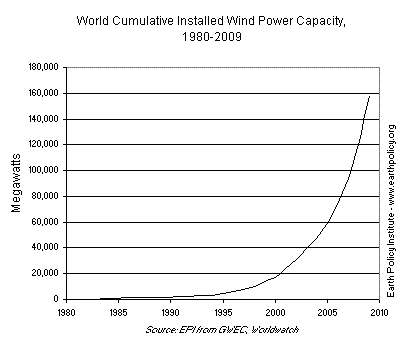
Even in the face of a worldwide economic downturn, the global wind industry posted another record year in 2009 as cumulative installed wind power capacity grew to 158,000 megawatts.
With this 31 percent jump, the global wind fleet is now large enough to satisfy the residential electricity needs of 250 million people. Wind provides electricity in over 70 countries, 17 of which now have at least 1,000 megawatts installed.
China led the way in 2009 with an astonishing 13,000 megawatts of new wind capacity, the first time any country has built more than 10,000 megawatts in a single year. With 25,000 megawatts overall, China has doubled its total installed wind capacity in each of the last five years, bringing it into third place behind the United States and Germany. And considering the ambitious projects already in its development pipeline, it is not likely to stay in third place for long. More >>>
Wednesday, March 10, 2010
Bahamas Drinking water 'under threat'

THE availability of fresh drinking water in the Bahamas could be jeopardised by climate change and hurricanes, warned State Environment Minister Phenton Neymour, who said this country urgently needs proper water networks and management policies.
Anticipated sea level rise from climate change, hurricane motivated storm surges -- and even heavy rain -- can all contaminate precious water well-fields with brackish, salty water, cautioned Mr Neymour, leading to severe water shortages and unavailability. More >>>
Monday, March 8, 2010
Maldives To Fight Rising Sea Levels With Floating Islands

The tiny island nation of the Maldives is under serious threat from rising sea levels caused by climate change.
No part of the 1200 islands which make up the Maldives is more than six feet above sea level, so as sea-levels rise (as they will if rampant climate change is not stopped), the entire nation will be under water. Because of this, the Maldives government is pulling out all the stops in the fight against climate change. Not only has the entire country gone carbon neutral, educated all of their children in environmental science and furiously built retaining walls around every island, but the government is buying up land in nearby nations as a place to retreat to when the Maldives disappears. Now it appears that the intrepid Maldivians have come up with a new strategy to fight the rising tide: creating mini floating islands! More >>>
Tuesday, March 2, 2010
Sweden to build 2000 wind turbines over next decade
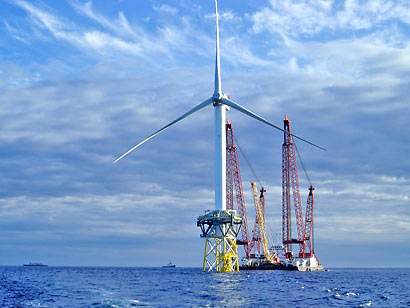 Sweden plans to build 2,000 wind turbines by 2020
Sweden plans to build 2,000 wind turbines by 2020STOCKHOLM - Sweden is planning to build 2,000 new wind turbines in the next 10 years to expand its total power production by 25 terrawatt hours from alternative energy sources.The increase is equivalent to about half of the power generated by the country's nuclear reactors in 2009.
Nuclear power currently accounts for about 50 percent of Sweden's electricity production.The government said Tuesday it would present parliament on Thursday with its proposal for increasing wind power by 10 terrawatt hours.
Sunday, February 21, 2010
British Overseas Territory Ramps Up Wind Power
 Renewable Energy to Supply 40% of Falklands Power
Renewable Energy to Supply 40% of Falklands PowerAnnual wind power contribution in the Falkland Islands is set to rise to 40 per cent of total energy generated with the installation of three new wind turbines, which started going online on 15 February. The installation of the first three wind turbines in 2007 has resulted in the displacement of 26% of annual fuel consumption and the aim with the three new turbines is to reach 40% fuel displacement.
To read the press release in full, please click here.
Tuesday, February 9, 2010
Industry group warns that oil crunch is coming within five years

Sir Richard Branson, founder of the Virgin Group, will say the coming crisis could be even more serious than the credit crunch. Photograph: Peter Schneider/EPA
Sir Richard Branson and fellow leading businessmen will warn ministers this week that the world is running out of oil and faces an oil crunch within five years.
The founder of the Virgin group, whose rail, airline and travel companies are sensitive to energy prices, will say that the coming crisis could be even more serious than the credit crunch.
"The next five years will see us face another crunch – the oil crunch. This time, we do have the chance to prepare. The challenge is to use that time well," Branson will say. More >>>
Monday, February 8, 2010
Incentives to Going 'Off Grid' Bring Power to the People

February 8, 2010 by CNN - The price of power has always been a political issue -- but now campaigners argue it could be the key to starting a green energy revolution.
Roofs in the Vatican City covered with solar panels point the way to off-grid power.
On February 1, the British Government announced details of the rates that will be paid for renewable power generated by homeowners and communities.
Called the Clean Energy Cashback, or feed-in tariff (FIT), the aim is to provide an above-market bonus that will encourage individuals and groups to invest in solar panels, wind turbines and other forms of green power. More >>>
Saturday, February 6, 2010
Vanishing Island States and sovereignty
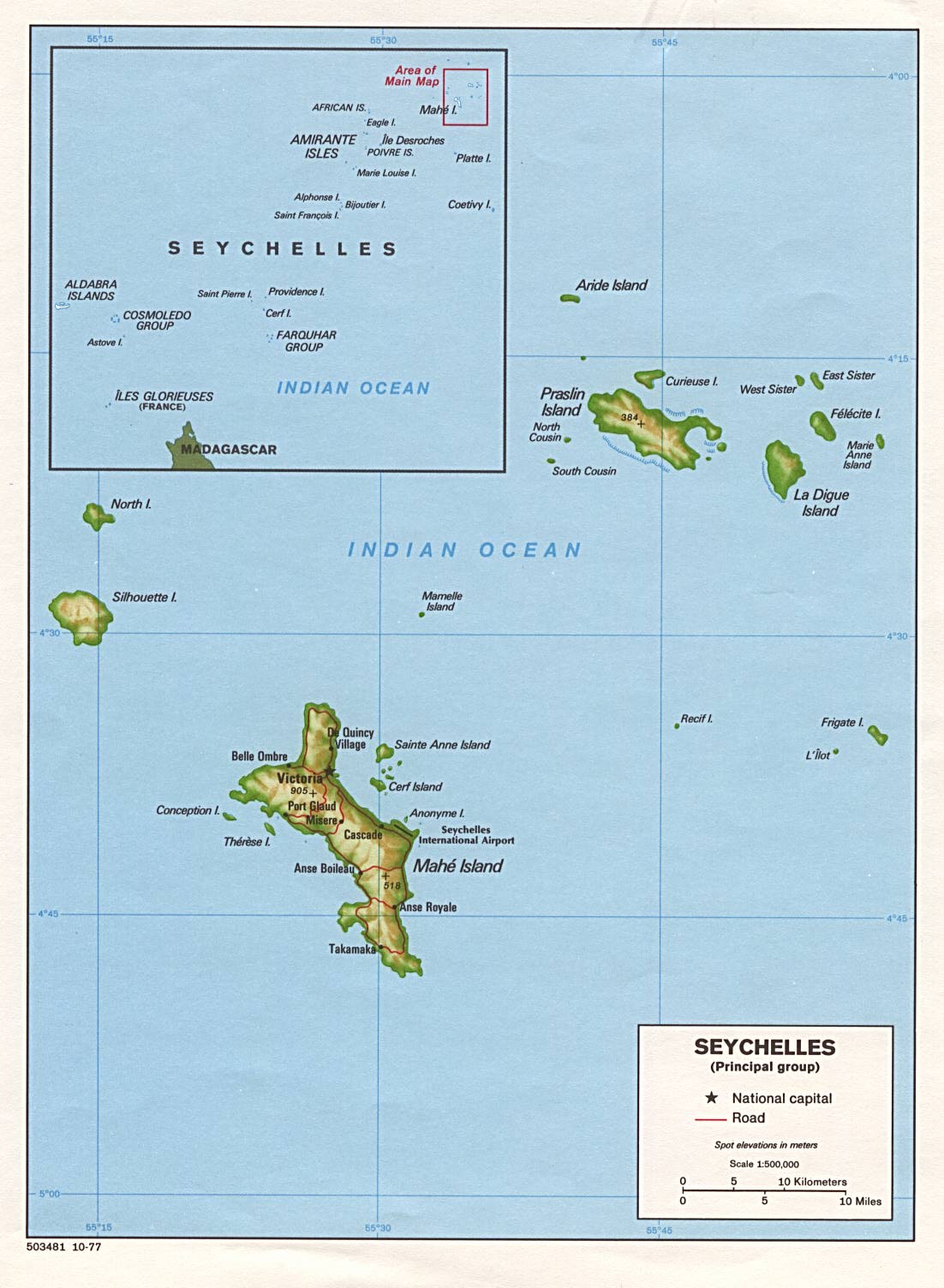
Abstract
Sea level rise could bring about an event that has not previously been seen in modern history, that of the physical disappearance of some low-lying Island States.
The objective of this paper is to examine what are the likely scenarios for some of these islands in the course of the next century, and analyse for each scenario if these Island States could continue to claim an Exclusive Economic Zone or not.
Also, it will analyse the possibility that Island States could continue having some sort of status analogous to state- hood even if it was to lose all territory. Finally, the idea of a ‘‘government-in-exile’’ will be discussed, where the State could retain its identity waiting for a future re-emergence of the island. More >>>
Sunday, January 31, 2010
Monster tides smother Torres Strait islands

January 31, 2010 RISING sea levels drove king tides across vulnerable island communities in the Torres Strait, causing damage to homes and infrastructure.
Monster tides swept through Australia's most northern island of Saibai yesterday, flooding homes, sewage treatment works, water supplies, crops and sacred cultural sites.
"What baffles me is the Federal Government can give $150 million to the Pacific Islands for climate change, but it won't fix up our back yard when we are being inundated right now," Torres Strait Regional Authority chairman Toshie Kris said.
"We have tried many ways to bring this to the attention of the Prime Minister. We have invited him to the islands to see first-hand, but we have had no response." More >>>
Saturday, January 23, 2010
Global warming is real, and we should be worried

January 22, 2010 - Our Cascade Range was the "nursery" for Seattle-based explorer, author and photographer James Martin, the Canadian Rockies' Athabasca Glacier was where he learned to ice climb, and South Georgia Island near Antarctica is his favorite of all places.
But Martin, author of "Planet Ice", has also learned that ice is the key to life for polar bears in the Arctic, farmers near the Equator in Peru, and even the globe's most populous nation.
"The northern part of Tibet is called the water tower of China, and it is going dry," Martin told an audience at The Mountaineers on Thursday night. More >>>
Friday, December 4, 2009
An excellent video on the melting of the Himalayan glaciers
Visit msnbc.com for breaking news, world news, and news about the economy
Saturday, November 28, 2009
Sea level rise could cost port cities $28 trillion
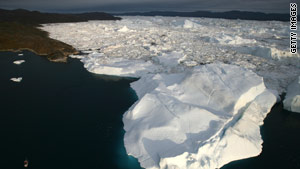
London, England (CNN) -- A possible rise in sea levels by 0.5 meters by 2050 could put at risk more than $28 trillion worth of assets in the world's largest coastal cities, according to a report compiled for the insurance industry.
The value of infrastructure exposed in so-called "port mega-cities," urban conurbations with more than 10 million people, is just $3 trillion at present.
The rise in potential losses would be a result of expected greater urbanization and increased exposure of this greater population to catastrophic surge events occurring once every 100 years caused by rising sea levels and higher temperatures. More >>>
Saturday, November 21, 2009
Climate change to lash Britain with tropical storms

BRITAIN should brace itself for more tropical-style deluges of the kind that wreaked havoc on Cockermouth, according to climate experts.
They warn that, although no single event can be attributed to climate change, the warming of the atmosphere caused by greenhouse gases means such disasters will become more frequent.
“We need to follow the example of tropical cities like Kuala Lumpur and Singapore where flooding is a regular event,” said Roger Falconer, professor of water management at Cardiff University.
“They have huge flood drains and roads, all designed to channel water away from danger areas. Britain must learn to think the same way.”
Such warnings are in line with recent studies into how Britain’s climate may change. They suggest summers will become drier and warmer, but winters will be marked by storms, strong winds and more deluges.
More >>>
Sunday, November 1, 2009
Japan accelerates purchase of surplus solar electricity at homes

TOKYO — Sunday 1st November, - The government launched Sunday a new program that enables power companies to purchase at higher rates surplus electricity produced by solar power generation systems installed in homes, schools and hospitals.
The move is Japan’s latest attempt to make photovoltaic generation, which is cleaner in terms of carbon emissions than fossil fuels, more popular at the public level and to step up efforts to fight global warming. On Saturday, the government said it may further accelerate such efforts, with Deputy Prime Minister Naoto Kan expressing his hope to launch another program during the year through March 2011, under which utility companies would buy all the solar electricity generated at homes and elsewhere. Kan said that would help give incentives to people to install solar panels on their roofs with ‘‘the state not required to spend even 1 yen.’’ Under the program begun Sunday, effective through the next 10 years, many of the utility firms will almost double payments to 48 yen for each kilowatt generated per hour by households and 24 yen by schools, hospitals and other facilities.
To cover the rise in costs, the electricity companies will collect a monthly surcharge of around 30 yen from every household and organization using electricity in the country, starting in April. The surcharge is expected to rise to 50 to 100 yen in the next five to 10 years and critics say the additional burden will only weaken consumer sentiment, delaying Japan’s emergence from the economic downturn. More >>>


